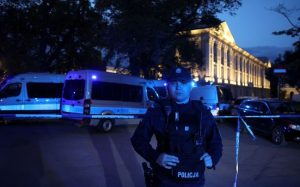Chinese nationals arrested with gold bars and $800,000 cash in DR Congo
3 min readThree Chinese nationals were arrested in the Democratic Republic of Congo (DRC) for being in possession of 12 gold bars and $800,000 in cash, raising further concerns over illegal mining and the plundering of the nation’s natural resources. The men were detained in the eastern region of the country, specifically in South Kivu province, after a secretive operation led by local authorities. The authorities found the gold and cash hidden beneath the seats of the vehicle the suspects were traveling in, according to Jean Jacques Purusi, the governor of South Kivu.
The arrest is part of the DRC’s ongoing efforts to clamp down on illegal mining activities, particularly in the rich mineral reserves of the eastern regions. These areas are known to hold significant quantities of gold, diamonds, and minerals used in the production of batteries for mobile phones and electric vehicles. However, the exploitation of these resources has been marred by illegal mining activities carried out by foreign groups, including Chinese nationals, over several decades. The plundering of these resources has been a contributing factor to the region’s prolonged instability and violence.
Militia groups, often with ties to foreign actors, control many of the mines in eastern DRC. They profit from the illicit trade of minerals, which are then sold to middlemen, who in turn sell them to international buyers. These activities have fueled regional conflicts and sustained armed groups that continue to wreak havoc on local communities. Reports suggest that some of the dealers in precious metals have close relationships with influential figures in the DRC’s capital, Kinshasa, which complicates efforts to hold them accountable.
The recent arrests were carried out quietly after a tip-off, and authorities conducted a meticulous search of the vehicle in the Walungu area, near the Rwandan border, where the gold and cash were found. The exact quantity of gold seized was not disclosed by local officials, but the discovery highlights the ongoing issue of illegal mining in the region. It also sheds light on the challenges faced by local authorities in curbing these illegal operations, especially when those involved have strong political or economic ties within the country.
Purusi had previously expressed his disappointment after the release of 17 Chinese nationals in March, who were accused of running an illegal gold mine in the region. These individuals were allowed to return to China despite owing the Congolese government $10 million in taxes and fines, a decision that the governor described as undermining efforts to address the problems within the country’s mining sector. The Chinese embassy has yet to comment on these allegations, and the release of the suspects has raised concerns about the level of influence foreign nationals can exert over the DRC’s governance.
In addition to these legal and political challenges, the conflict in the neighboring North Kivu province has escalated, with a Rwanda-backed rebel group seizing large swathes of territory. This further complicates the already volatile situation in the eastern DRC. As a result, the Congolese government is under increasing pressure to address not only the illegal mining and its associated criminal activities but also the growing regional instability.
The situation has drawn international attention, with the DRC government recently filing a lawsuit against tech giant Apple for allegedly sourcing “blood minerals” from conflict areas in the region. The lawsuit accuses companies like Apple of indirectly fueling violence and human rights abuses by purchasing minerals from militias and armed groups that exploit these resources. Apple has since responded, stating that it no longer sources materials from the DRC and neighboring Rwanda.
The lawsuit also highlights the environmental damage and the exploitation of child labor associated with illegal mining operations. Lawyers representing the Congolese government argue that the illegal trade of minerals has created a cycle of violence and poverty, as well as widespread environmental destruction.
Despite these challenges, the recent arrests of the Chinese nationals offer a glimmer of hope for the Congolese authorities, who are determined to tackle the country’s mineral trade corruption. However, as long as powerful foreign actors continue to exploit the country’s resources with the complicity of some local elites, it remains to be seen whether these efforts can bring lasting change to the DRC’s mineral sector. The involvement of China and Rwanda in these activities underscores the complex geopolitics at play in the region, where economic interests often collide with human rights and security concerns.






